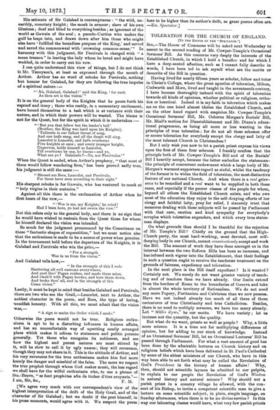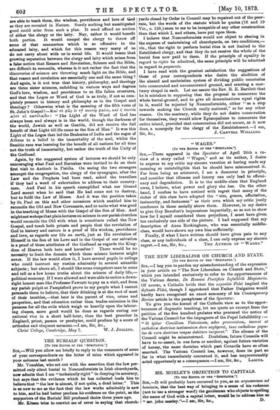TOLERATION FOR THE CHURCH OF ENGLAND.
(TO THE EDITOR OP THE SPECTLTOR.1
Sin,—The House of Commons will be asked next Wednesday to assent to the second reading of Mr. Cowper-Temple's Occasional Sermons' Bill. As this concerns very deeply the interests of the Established Church, in which I hold a benefice and for which I have a deep-seated affection, such as I cannot fully describe in words, I have been led to ask myself what are the merits or demerits of the Bill in question.
Having lived for nearly fifteen years as scholar, fellow and tutor in Christ's College, where the great apostles of toleration, Milton, Cudworth and More, lived and taught in the seventeenth century, I have become thoroughly imbued with the spirit of toleration towards all kinds of opinions, whether political or religious, ortho- dox or heretical. Indeed it is my faith in toleration which makes me on the one hand almost idolise the Established Church, and on the other hand regard with suspicion Mr. Cowper-Temple's Occasional Sermons' Bill, Mr. Osborne Morgan's Burials' Bill, Mr. Miall's motion for Disestablishment and Mr. Dixon's educa- tional programme, as being all more or less wanting in the principles of true toleration ; for do not all these schemes offer or secure toleration for everybody except the clergy and laity of the most tolerant Church in Christendom?
But I only wish you now to let a parish priest express his views upon the first of these four schemes. I frankly confess that the principle both of Mr. Cowper-Temple's Bill and of the Burials' Bill I heartily accept, because the latter embodies the statesman- like principle of concurrent endowment which a large body of Mr. Morgan's warmest supporters regard as sinful, whilst the tendency of the former is to widen the field of toleration, the most distinctive feature of our national Church. And when there is a real griev- ance to be remedied and a real want to be supplied in both these cases, and especially if the poorer classes of the people for whom, beyond all others the Established Church exists, and who owe most of the education they enjoy to the self-denying efforts of her clergy and faithful laity, pray for relief, I sincerely trust that measures dealing with these subjects will be passed by Parliament with that care, caution and kind sympathy for everybody's scruples which toleration engenders, and which every true states- man displays.
On what grounds then should I be thankful for the rejection of Mr. Temple's Bill? Chiefly on the ground that the High- Church party, the most hard-working, most devoted, most self- denying body in our Church, cannot conscientiously accept and work the Bill. The amount of work they have done amongst us in the interval between the two Reform Bills has been so immense, and has infused such vigour into the Establishment, that their feelings in such a question ought to receive the tenderest treatment on the grounds of fairness, expediency and toleration.
In the next place is the Bill itself expedient ? Is it wanted ? Certainly not. We surely do not want greater variety of teach- ing and of teachers than we have already. Our limits extend from the borders of Rome to the boundaries of Geneva and take in almost the whole territory of Rationalism. We do not need any more Popery, Puritanism and Calvinism than we now possess. Have we not indeed already too much of all three of these caricatures of true Christianity and true Catholicism. Besides, there is no need to multiply sermons, we have too many already. Let " MO:4 dyco," be our motto. We have variety ; let us increase not the quantity, but the quality.
But what do we want, priests as well as people ? Why, a little more science. It is a time not for multiplying differences of opinion, but for adding to our stock of knowledge. Instead of an Occasional Sermons' Bill, let an Occasional Lectures' Bill be passed through Parliament. For what a vast amount of good has been done by the admirable lectures on Church history and on religious beliefs which have been delivered in St. Paul's Cathedral by some of the ablest ministers of our Church, who have in this way been able to set forth what may be called the Revelation of God's Providence in the history of human affairs ! Why, then, should not scientific laymen be admitted to our pulpits, to explain to our people the Revelation of God's Wisdom in natural history and natural science ? Why should not a parish priest in a country village be allowed, with the con- sent of his Bishop, to invite a competent scientific man to give a lecture on some scientific subject, in plain, simple language, on Sunday afternoons, when there is to be no divine service ? In this way our labouring classes would learn, what very few parish priests are able to teach them, the wisdom, providence and love of tio'od as they are revealed in Nature. Surely nothing but unmitigated good could arise from such a plan. It need offend no section of either the clergy or the laity. Nay, rather it would benefit
both parties. It would compel the clergy to throw off some of that mannerism which is so offensive to the educated laity, and which for this reason very many of us do not carry about with us in social life. It would lessen that growing separation between the clergy and laity which arises from a false notion that Reason and Revelation, Science and the Bible, are difficult to reconcile, whereas is it not rather the fact that the discoveries of science are throwing much light on the Bible, and that reason and revelation are essentially one and the same thing ? And again, is it not true that history, philosophy, and theology are three sister sciences, unfolding in various ways and degrees God's love, wisdom, and providence to us His fallen creatures, and that the Logos or Word of God is as truly, if not as com- pletely present in history and philosophy as in the Gospel and theology ? Otherwise what is the meaning of the fifth verso of St. John's Gospel ?-1Cai ri saZa- iv ri." ssoricc cthn, xai exATIa
xariAat3gy : "The Light of the Word of God has always been and always is in the world, though the darkness of the world, Jewish as well as Gentile, did not receive the full benefit of that Light till He came as the Son of Man." It was this Light of the Logos that led the Brahmins of India and the sages of Athens to a belief in the immortality of the soul, whilst the Semitic race was learning for the benefit of all nations for all time not the truth of immortality, but rather the truth of the Unity of the Godhead.
Again, by the suggested system of lectures we should be only encouraging what Paul and Barnabas were invited to do on their first visit to Antioch in Pisidia. On seeing the two strangers amongst the congregation, the clergy of the synagogue, after the Law and the Prophets had been read, asked the travellers if they had a word of exhortation to address to their country- men. And Paul in his speech exemplified what our blessed Lord meant when he said that He had come not to destroy, bat to fulfil the Law of Moses. And it was the position taken by St. Paul on this and other occasions which enabled him to reconcile the Old and New Covenants, and to unite what was good in the teaching of Moses with the Gospel of the Son of Man. And mightnot we hope that plain lectures on science in our parish churches would reconcile the Old with what is sometimes called the New Gospel, and teach both priests and people that the revelation of God in history and nature is a proof of His wisdom, providence and love, as regards our life on earth, just as His revelation of Himself in the Son of his Love and in the Gospel of our salvation is a proof of these attributes of the Godhead as regards the King- dom of Heaven both here and hereafter ? There would be no necessity to limit the domain which these science lectures might cover. If the law would allow it, I have several pupils in college who could instruct my rustics admirably in several scientific subjects ; but above all, I should like some competent man to come and tell us a few home truths about the science of daily life,— political economy. If I were allowed and were able to entice a down- right honest man like Professor Fawcett to pay us a visit, and from my parish pulpit at Pampisford prove to my people what I cannot persuade them to believe, that their drinking is at the root of most of their troubles,—that beer is the parent of vice, crime and pauperism, and that education rather than trades-unionism is the panacea for all the evils which weigh so heavily upon the labour- ing classes, more good would be done as regards curing our national vice in a short half-hour, than the best preacher in England, priest, parson or presbyter, could produce by a score of orthodox and eloquent sermons.—I am, Sir, &c.,



































 Previous page
Previous page